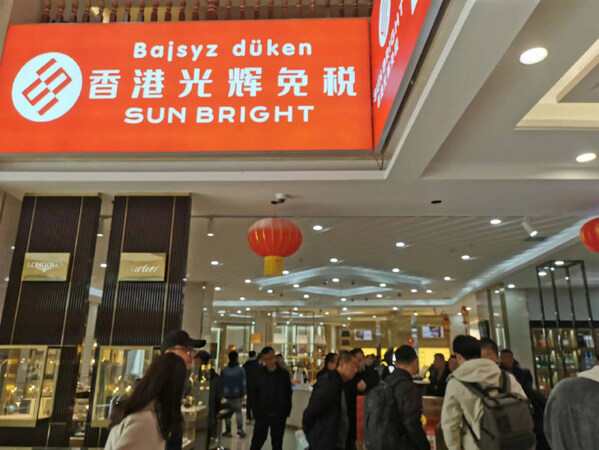BEIJING, Nov. 29, 2023 /PRNewswire/ -- A news report from Beijing Review:

A duty-free shop at the China-Kazakhstan Khorgas International Border Cooperation Center on November 8 (JI JING)
Khorgas was once a busy passage used by traders traveling along the ancient Silk Road. As a border pass, it dates back more than 140 years. Today, it is one of China's closest overland ports to Central Asia and Europe.
The Belt and Road Initiative, proposed by China 10 years ago with the aim of strengthening connectivity along and beyond the ancient Silk Road routes, has given the old port in Xinjiang Uygur Autonomous Region a modern makeover.
In Mongolian, Khorgas means a place where camels pass, and in the Kazak language, it means a place where wealth is accumulated. The area is home to a number of ethnic groups.
Since the first China-Europe freight train passed through Khorgas Railway Port in 2016, the number of such trains has increased from fewer than 700 to more than 7,000 last year, according to port data. Eighteen railway lines pass through the port to 18 countries, including Germany, Poland and Belgium, carrying more than 200 categories of cargo.
The exported products include electronic products, clothes and cars. Goods imported through the port include agricultural products and food.
Today, the border city's increasingly convenient transportation and geographic location have attracted many people and businesses to accumulate wealth.
Russian food processing company Golden Katyusha set up shop in the city in 2016. The company has been included in the city's comprehensive bonded zone since the zone's establishment in 2020, becoming the first foreign company in the zone. The zone is a specially designated area under the supervision of Chinese customs and enjoys favorable tax policies. For instance, imported infrastructure materials and equipment are exempt from import duties and other related taxes.
The company imports raw materials such as flour and rapeseed oil from Novosibirsk, Russia, and processes them into noodles, cooking oil and biscuits.
Russian wheat flour and rapeseed oil are cheaper and known for their high quality, and are very popular with Chinese consumers, Iurii Basargin, the company's general manager, told Beijing Review.
The relatively short distance between Novosibirsk and Khorgas and efficient customs procedures allow these materials to arrive in the zone within two days. This, combined with the favorable tax policies, makes Basargin confident about doing business in the city.
China approved setting up the China (Xinjiang) Pilot Free Trade Zone (FTZ) in a circular issued by the State Council, China's cabinet, on October 31. The FTZ, the first in China's northwestern border regions, officially started operations on November 1.
FTZs in China are a type of special economic zone. Goods can be imported, processed, manufactured and exported without direct customs intervention.
Each FTZ in China has a specific industrial and economic focus, with a different set of incentives designed to achieve its objectives. FTZ incentives and regulations are aligned with the ongoing policy priorities of the Chinese Government.
Khorgas is one of the three areas included in the Xinjiang Pilot FTZ. According to the circular, the FTZ, composed of parts of Urumqi (the regional capital), Khorgas and Kashgar (another border city), covers a total area of 179.66 square km and will focus on emerging industries, labor-intensive industries and the modern service industry.
The circular called for efforts to transform the zone into a demonstration model of high-quality development for the country's central and western regions.
Yu Chengzhong, Chairman of Jin Yi Group, an agricultural products trade company in Khorgas, told Beijing Review that the FTZ is expected to boost its trade with Central Asia and Russia, as more convenient and faster trade means a fresher taste of fruits and vegetables.
"In Khorgas, we can feel the country opening up wider, and there are increasingly better policies and more opportunities for businesses," Yu said.
Comments to yanwei@cicgamericas.com